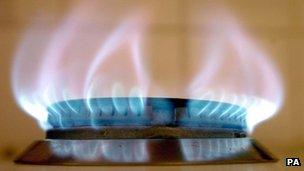Are British Gas's profits too big?
- Published
- comments

Centrica, which owns British Gas, has seen its profits rise
Centrica was unhappy this morning at my pointing out on the Today Programme that its revenues from supplying gas to households in the UK rose 21% to £3.2bn the first half of the year, whereas consumption of gas increased 3.2%.
I drew the implication, which is unavoidable, that prices charged by its British Gas business had risen - and that this might upset a few people.
There is a similar story in electricity revenues: consumption actually fell 0.1% (a big hooray for energy conservation) whereas revenues were up 10% to £1.6bn.
Thanks to tighter control of costs, these revenue increases translated into operating profits from the supply of gas and electricity of £345m, 23% higher than in the same period of last year.
Now, to be clear, I did not make any value judgements about this. I did not suggest, for example, that Centrica is profiteering.
I simply said that in this period of recession, increases in revenues driven by higher prices would be controversial.
The chief executive of Centrica, Sam Laidlaw, says I am painting a misleading picture - that I failed to point out that British Gas's residential supply business had an unusually weak first half last year, and that profits were therefore returning to nearer the norm.
There is something in this. In the first half of the current year, the margin earned by British Gas - that is profit as a percentage of sales - was 7.2%, compared with 6.9% in the first six months of last year, and 8.9% in the whole of 2010.
Or to put it another way, British Gas is earning lower profits than when many would have accused it of profiteering.
Mr Laidlaw also says that British Gas's margins are comparable to those of many retailers, which - he says - have much lower capital investment needs than Centrica.
To put it another way, Laidlaw says Centrica needs to generate the extra dosh to maintain and improve its supply network.
This is a slightly curious argument, in that - in today's recessionary conditions - most retailers would kill to have British Gas's margins and ability to set prices.
And that is the point. Unlike most retailers, Centrica sells stuff, energy, that we all have to buy.
We don't have to buy it from Centrica. There is competition. But it has significant market power, with 40% of the residential gas market and 25% of the electricity market.
So the question for Centrica's board is really about British Gas's responsibilities in a time of economic stagnation, when millions of people feel their available income is being squeezed.
Is this a period in which it should be showing greater solidarity with hard-pressed customers, by keeping prices lower than it would normally do in more buoyant economic conditions?
This is not about whether Centrica needs to abandon business common-sense and become some kind of philanthropic organisation, but about what pricing strategy will best enhance its reputation - which, after all, is the licence to operate that really matters.